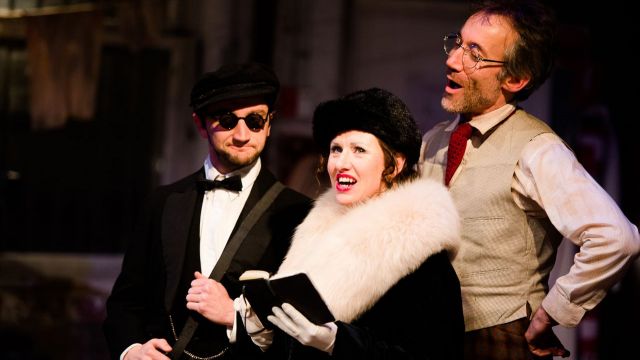Mein Kampf
On first meeting the poor would-be art student, Adolf Hitler, in a Jewish flophouse, Bible peddler and would-be writer, Schlomo Herzl, remarks, ‘Strange, you don’t look at all Jewish.’ The line got a laugh at the play’s premiere and has done so in numerous productions and many languages ever since. Mein Kampf is a very black comedy, a mixture of farce, insight, erudition, slapstick, crude jokes (both sexual and scatological), real wit and devastating ironies. When Hitler is rejected by the Vienna art school, it is Jewish Schlomo who advises him to go into politics – and helpfully trims his ridiculous moustache to the familiar ‘toothbrush’.
Can we laugh at Adolf Hitler? How about Hitler’s victims? George Tabori, who believed that the joke was the most perfect literary form, says ‘yes’. Laughter is necessary – or anyway, better than tears in order to understand and bring perspective to life’s tragedies. Tabori was, after all, an admirer, translator and director of Bertolt Brecht.
Mein Kampf (also the title of course of Hitler’s autobiography) was first performed at the Vienna Akadamietheater in 1987. The play gave permission, as it were, finally to laugh at Hitler – without saying that he was anything less than a monster, but one who was also ridiculous.
Tabori, a Hungarian Jew forced to leave Germany in 1933 and who lost most of his family to the Nazis, brought his lifetime of experience and thinking to bear on the tension between Jew and German. On the one hand, he is implicitly critical of Jewish Schlomo, who is so taken up with jokes, storytelling, philosophizing and speculating that he cannot engage with what’s right in front of him. A program note quotes Hölderlin: Must you forever be playing and jesting?/You must, oh my friends, which sickens my soul/For only the desperate must. On the other hand, Schlomo does exhibit real kindness for ‘poor’ Hitler and then, finally, realises (too late) that, in Hitler, he has found a man who ‘cannot accept love’.
 La Mama’s sold out production of Mein Kampf was in August 2013. Now La Mama, together with fortyfivedownstairs, presents this encore presentation in the more spacious fortyfivedownstairs play space. It’s an energetic and inventive production by director Beng Oh – although in the first half it mistakes haste for pace: lines are garbled and jokes lost. Stelios Karagiannis’ lighting is straightforward but totally appropriate – as is Peter Mumford’s set. Amaya Vecellio’s costumes match very well the text’s mix of vaudeville and ‘period’ drama.
La Mama’s sold out production of Mein Kampf was in August 2013. Now La Mama, together with fortyfivedownstairs, presents this encore presentation in the more spacious fortyfivedownstairs play space. It’s an energetic and inventive production by director Beng Oh – although in the first half it mistakes haste for pace: lines are garbled and jokes lost. Stelios Karagiannis’ lighting is straightforward but totally appropriate – as is Peter Mumford’s set. Amaya Vecellio’s costumes match very well the text’s mix of vaudeville and ‘period’ drama.
Steve Gome as Schlomo Herzl is tall and thin, and brings an impish, mischievous but abstracted air to the character. When Schlomo’s would-be lover, Gretchen, coils herself around him, he goes right on talking. Stephania Pountney, as Gretchen, manages to delivers sweetness and self-possession while totally naked – and then later, since Schlomo turns her down, she becomes an enthusiastic member of the Hitlerjugend.
Glenn van Oosterom takes the key role of Hitler. He enters on his knees, with shoes attached, suggesting either a dwarf or a child, only to stand full height when he becomes the politician ‘Hitler’. Mr van Oosterom brilliantly gives us the inadequate and socially inept young Adolf’s prejudices and prudishness, and skillfully signals in embryo the later dictator’s gestures and hectoring shouting – to the audience’s delighted recognition. When he ‘grows up’ and enters politics, he is chilling. David Kambouris plays Schlomo’s comedy foil Lobkowitz with brio. Sarah Bollenberg takes the risky role of Frau Death - the ‘Grim Reaper’ as a Viennese matron (a very Tabori touch) who favours us with a sweet chanson. She’s accompanied by ever-alert assistant Leopold – Troy Larkin, who doubles later as Himmlisch, a manic – or maniacal – cooking demonstrator who carves up what looks very much like a real, raw chicken on stage. Mr Larkin is an actor of enormous presence whom we wish had more to do here – and whom we know we’ll see in the future.
This is a rich and layered presentation, perhaps a little rough around the edges, but provocative, profound and very funny. Laughter does promote thought. There is every chance that it will sell out this time round as well.
Michael Brindley
Images: Sarah Bollenberg and Troy Larkin & Glenn van Oosterom and Steve Gome. Photographer: Lachlan Woods.
Subscribe to our E-Newsletter, buy our latest print edition or find a Performing Arts book at Book Nook.

